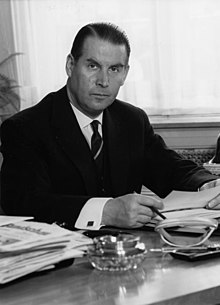Election of the German Federal President in 1969
| Election of the German President in 1969 - third ballot | ||||
|---|---|---|---|---|
| Candidates | Votes in% | |||
| Gustav Heinemann | 49.4 | |||
| Gerhard Schröder | 48.8 | |||
| Abstentions | 0.5 | |||
On March 5, 1969, the 5th Federal Assembly elected the Federal Minister of Justice Gustav Heinemann as the third Federal President. He ran at the suggestion of the SPD (449 seats in the Federal Assembly). Shortly before the election, the FDP (83 seats) decided to support him. The NPD (22 seats) declared itself in favor of the Federal Defense Minister Gerhard Schröder , who was nominated by the CDU (482 seats) .
composition
The 5th Federal Assembly consisted of 1036 voting members, 482 of them for the CDU / CSU, 449 for the SPD, 83 for the FDP and 22 for the NPD. On the day of the Federal Assembly, however, only 1,023 members were present, the others had reported sick and could not be flown in either.
course
In the first ballot, SPD candidate Gustav Heinemann won 514 votes, five fewer than an absolute majority; CDU candidate Gerhard Schröder won 501 votes. The second ballot did not produce the necessary absolute majority either: Heinemann won 511 votes, Schröder 507 votes.
In the third ballot, the votes of the NPD could have tipped the balance, Candidate Schröder is said not to have been bothered by a possible election by NPD votes, since the NPD members are "ultimately also democratically elected". Schröder is said to have suggested to Willy Brandt (SPD) and Horst Ehmke instead that SPD and FDP 22 delegates could vote for him in order to prevent the NPD's votes from becoming decisive.
Heinemann won in the third ballot with 512 and thus only six votes ahead of Schröder (506 votes), the narrowest result so far in a federal presidential election. Even if all 18 votes not cast and abstentions in the last ballot are attributed to social and free democrats, two of them must have voted for the CDU candidate Schröder.
Heinemann is the only Federal President who was not elected with an absolute majority. Only in 1994 and 2010 there was a third ballot in the federal presidential election, in which Roman Herzog and Christian Wulff achieved an absolute majority.
After the election, Heinemann spoke of a “piece of power change”. After the federal election on September 28, 1969, the social-liberal coalition of the SPD and FDP came about in the Bundestag .
Voting results of the three ballots
| Berlin, March 5th, 1969 - total number of votes 1036 - absolute majority 519 | ||||
|---|---|---|---|---|
| Ballot | candidate | Number of votes | % | Political party |
| 1st ballot | Gustav Heinemann | 514 | 49.6% | SPD |
| Gerhard Schröder | 501 (499 votes were counted at the first count) | 48.4% | CDU | |
| Abstentions | 5 (6 abstentions were counted in the first count) | 0.5% | ||
| invalid votes | 3 (2 invalid votes were counted at the first count) | 0.3% | ||
| not submitted | 13 | 1.3% | ||
| 2nd ballot | Gustav Heinemann | 511 | 49.3% | SPD |
| Gerhard Schröder | 507 | 48.9% | CDU | |
| Abstentions | 5 | 0.5% | ||
| not submitted | 13 | 1.3% | ||
| 3rd ballot | Gustav Heinemann | 512 | 49.4% | SPD |
| Gerhard Schröder | 506 | 48.8% | CDU | |
| Abstentions | 5 | 0.5% | ||
| not submitted | 13 | 1.3% | ||
| Gustav Heinemann had thus been elected Federal President . | ||||
Web links
- Information about the Federal Assembly on the homepage of the Bundestag
- DER SPIEGEL March 10, 1969 "FDP - Wages of Fear"
- The longest choice , article from March 4, 1994 by Karl-Heinz Janßen on Zeit Online
- When the NPD almost decided the federal presidential election


